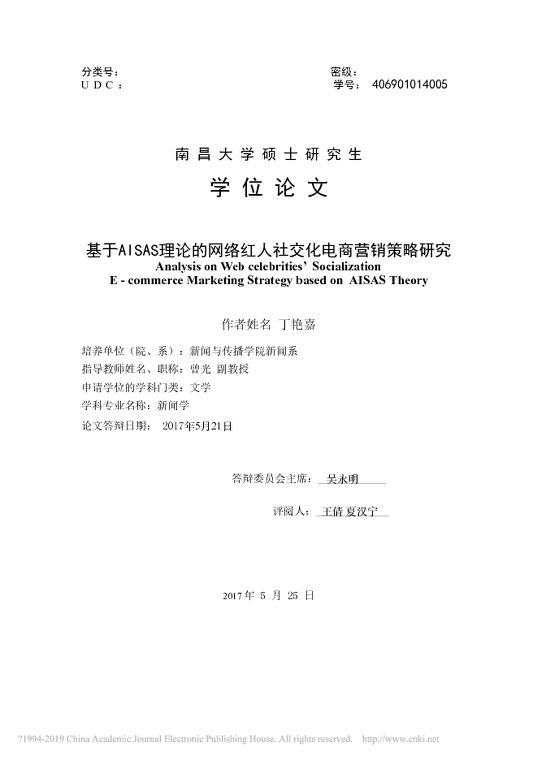基于AISAS理论的网络红人社交化电商营销策略研究_丁艳嘉.pdf
摘要 : In the new era of the Internet, both the competitive environment and consumer behavior have changed, which has challenged traditional marketing methods. The traditional marketing model is often centered around the enterprise, rather than the consumer. The rapid changes in the market require brands to innovate marketing methods and seek new models that benefit all parties to meet the diverse needs of customers. Based on the AISAS theory, marketing is based on the consumer as the core, with characteristics such as interactivity, timeliness, precision, and viral transmission.
In recent years, the phenomenon of "web celebrities" has gained immense popularity. The monetization ability of web celebrity groups in 2016 was remarkable, with e-commerce web celebrity Zhang Dayi's Taobao shop having a sales figure of over 100 million yuan on Singles' Day, and web celebrity broadcasters earning hundreds of thousands of yuan per day. Among the top 10 sales figures on Taobao for female clothing, 7 were from web celebrity shops. Despite competing with major brands and frequent discounts, web celebrity shops still sell remarkably well, making people wonder why their monetization ability is so amazing.
This paper mainly analyzes the marketing strategies of e-commerce web celebrities on social platforms, sorting out their development process and reasons for becoming popular, as well as their monetization methods. The paper explores how web celebrities guide social traffic to Taobao, and whether the socialized marketing of web celebrities is affected by changes in consumer behavior based on the AISAS theory. The author takes web celebrity Zhang Dayi as the research object, analyzing the reposted comments on her Weibo and conducting a questionnaire survey of her fans. The author believes that in the age of the Internet, consumers' shopping psychology and behavior have changed, with more emphasis on product quality, reputation, and a sense of participation in the shopping process.
Keywords: web celebrity; AISAS theory; Socialized E-commerce; consumer behavior.

相关报告
-
11.6 MB 14页 基于AISAS模型的社会化媒体营销研究_以小米公司网络营销为例_王江坤.pdf
-
3.7 MB 59页 新媒体环境下中华老字号化妆品的整合营销传播策略研究.pdf
-
9.44 MB 74页 2024AI时代的社交媒体营销进化-微播易-202407.pdf
-
4.08 MB 84页 2023中国电商营销趋势及增长策略研究报告-宏盟OMGx艾瑞咨询-202312.pdf
-
14.07 MB 91页 2023年电商营销趋势及增长策略-艾瑞咨询-202311.pdf
-
3.87 MB 25页 2020年老牌国货的年轻化之路——详析丸美的社媒营销策略-微播易-202009.pdf
-
6.39 MB 21页 电商白皮书系列四:升级电商制胜策略之站内内容营销-凯度-201903.pdf
-
10.87 MB 99页 2024年AI+生成式营销产业研究蓝皮书-明略科技x复旦大学x秒针-202409.pdf
-
3.29 MB 24页 行业研究系列 2023时趣互联网综合电商行业及营销趋势报告.pdf
-
4.51 MB 26页 女性大健康社媒营销策略研究-2023年.pdf
-
2.72 MB 28页 向光而生机遇无限—社交媒体营销商业化风向-微播易-202305.pdf
-
35.1 MB 109页 2023年行业分析报告——东南亚网红营销社交电商-StarNgage-202305.pdf
-
164.98 KB 3页 顾客期望理论在服务营销中的应用研究_刘金栋.pdf
-
1.06 MB 8页 非银金融行业研究-金融科技产业链跟踪三:同花顺,推动AI在金融领域的商业化实践
-
1.88 MB 50页 汽车2023年度策略:把握电动+智能化趋势下的自主崛起机遇2023年1月
-
4.61 MB 36页 消费品企业数字化营销及运营新策略-思略特-202212.pdf
-
2.48 MB 53页 流动时代下的人宠关系重构:2022宠物行业趋势洞察与营销策略-阿里妈妈-202208.pdf